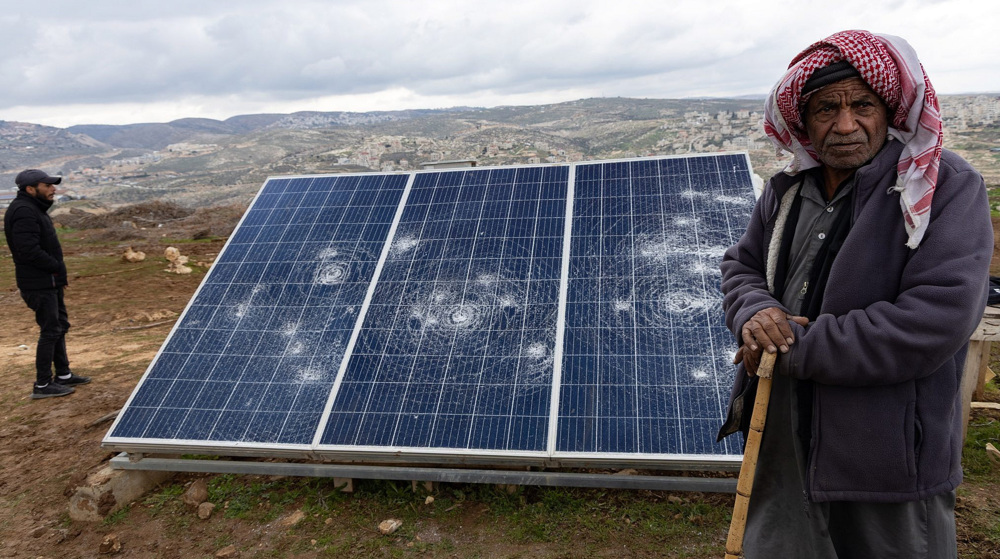Advocacy group warns of deteriorating health condition of Palestinian prisoner
A group advocating Palestinian prisoners’ rights has voiced serious concern about the health condition of a Palestinian prisoner who has been on hunger strike for over three months since he was arrested by Israeli military forces.
Qadri Abu Bakr, the head of the Prisoners and Ex-prisoners Affairs Authority, said on Sunday that Maher al-Akhras is gradually losing his vision and hearing abilities and became unable to speak in addition to other dangers threatening his vital organs.
He added that nearly 100 days after the Palestinian prisoner's hunger strike, Israeli authorities are still refusing to release him and insist that Akhras must complete his current administrative detention.
The official, however, emphasized that Akhras has vowed not to end his hunger strike unless his immediate release or transfer to a Palestinian hospital in the West Bank.
Bakr said the Palestinian inmate knows that Israeli authorities can extend his detention again.
“Palestinian efforts have not stopped in supporting Akhras in this heroic battle by following his condition at the highest levels," he added.
The 49-year-old Palestinian prisoner, the father of six children, was detained on July 27 and held under the administrative detention order, with no charge. This has led him to start a hunger strike in an attempt to seek justice.
Physicians have already warned of damage to several organs of the Palestinian prisoner’s body, such as the kidneys, liver, and heart, adding that the inmate’s senses of hearing and speaking have also been affected.
The United Nations and the European Union have called for Akhras's immediate release.
European Commission spokesperson for foreign affairs issues Peter Stano, in a statement released on October 30, said the bloc is closely monitoring the situation of Akhras, saying, “Regardless of allegations against Mr. al-Akhras, the European Union reiterates its long-standing concerns about Israel’s extensive of administrative detention without formal charges.”
The senior EU official then called on the Israeli regime to fully respect international humanitarian law as well as its human rights obligations towards all prisoners, particularly the Fourth Geneva Convention, and to do all it can to ensure the health of al-Akhras.
Her remarks came few days after the United Nations also called on the Israeli regime to put an end to the practice of administrative detention and immediately release Akhras.
Michael Lynk, UN special rapporteur on human rights in the Palestinian territories, strongly called on Tel Aviv to end administrative detention, in which Israel keeps the detainees for up to six months, a period which can be extended an infinite number of times, sometimes for years.
The International Committee of the Red Cross (ICRC) has warned that the Palestinian inmate is entering a medically “critical phase”.
“More than 85 days into the hunger strike, we are concerned about potentially irreversible health consequences,” said Yves Giebens, the head of the ICRC's health department in Israel and the occupied Palestinian territories, in a statement.
In 1989, he was arrested for the first time and his detention continued for seven months. Back in 2004, he was arrested for a second time and spent two years behind bars. In 2009, he was rearrested and remained in administrative detention for 16 months. In 2018, Akhras was arrested again and was held in custody for 11 months.
Despite the fact that there is no criminal offense that the Tel Aviv regime is holding Akhras for, the Israeli authorities refuse to release him, even as his health increasingly deteriorates on a daily basis.
The Israeli regime has so far rejected all calls to release Akhras.
Hundreds of Palestinian prisoners are held under administrative detention, in which Israel keeps the detainees for up to six months, a period which can be extended an infinite number of times. Women and minors are among these detainees.
Palestinian detainees have continuously resorted to open-ended hunger strikes in an attempt to express their outrage at the detention. Palestinians hold Israeli authorities fully responsible for any deterioration of the circumstances in jails.
More than 7,000 Palestinians are reportedly held in Israeli jails.
Hezbollah confirms 8 fighters killed in Israeli strikes on eastern Lebanon
Settler attacks in West Bank have displaced 880 Palestinian families: UN
Lebanon’s president condemns Israeli strikes as 'blatant act of aggression'
VIDEO | Epstein and Trump: Scandal, power, and political fallout
Trump admin. advances Saudi nuclear deal, leaves door open to enrichment: Report
Leader donates 50 billion rials to free financially struggling prisoners
Guardians of sky: How Iran’s radar network turned 12-day war into a blueprint for deterrence
The story of ancient Persia’s chromium steel











 This makes it easy to access the Press TV website
This makes it easy to access the Press TV website